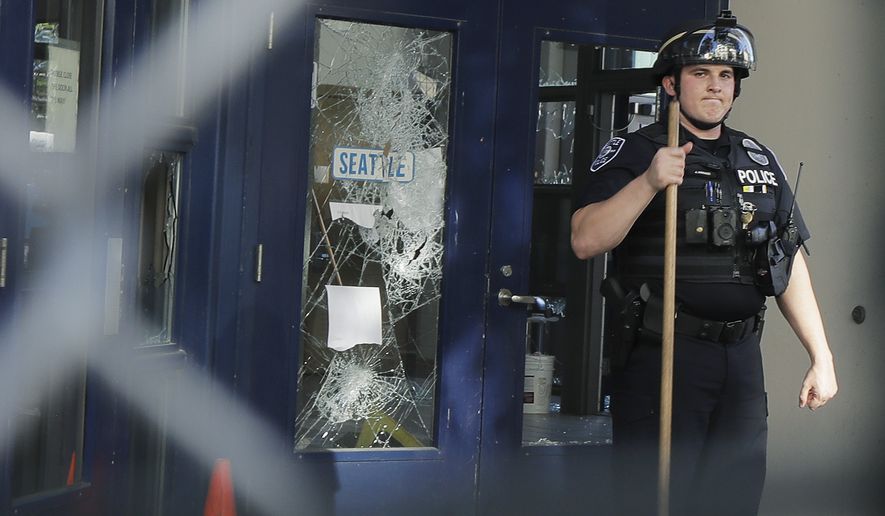Democratic mayors in two major cities that cut funding for police last year are now seeking more money to recruit officers as departments struggle to maintain staff.
D.C. Mayor Muriel Bowser asked the city council earlier this month to approve $11 million in supplemental budget funds to hire 170 more officers for the Metropolitan Police Department (MPD).
“We are already at a critical juncture, with MPD having over 200 fewer officers now than they did in September — the lowest staffing level in two decades,” Ms. Bowser said in a letter to the council. “Unless the council acts now, MPD will continue to shrink by approximately 120 officers over the next 14 months.”
Her request came days after Seattle Mayor Jenny Durkan said she wants her city’s council to lift restrictions on $7.5 million in police money and to reinstate a 2019 incentive program paying officers thousands of dollars as new hires or to make lateral moves.
“As a city, we cannot continue on this current trajectory of losing police officers,” Ms. Durkan said during a press conference at the end of July.
“Over the past 17 months, the Seattle Police Department has lost 250 police officers, which is the equivalent of over 300,000 service hours. We’re on path to losing 300 police officers,” she said.
Ms. Durkan’s proposal comes as city data show shootings are up 73% in the first half of this year compared to last — going from 69 to 120.
The mayor pointed to the creation of “meaningful alternatives” to policing, including efforts to shift police funding to community-led groups, but said that “the city has an obligation to still continue constitutional policing and respond to 911 calls.”
“It is a false choice between community-led solutions and police officers … We need both,” she said.
The Seattle City Council has not yet voted on the request.
Meanwhile, the D.C. Council slashed Miss Bowser’s request in half last week when it approved just $5 million in extra money for hiring. They decided the remaining $6 million should instead go to violence interruption programs.
The council’s decision comes as homicides in the nation’s capital are up 16% in the first six months of this year compared to last — going from 81 to 94, according to a recent report by the Major Cities Chiefs Association.
Similarly to Ms. Durkan, D.C. Councilmember Charles Allen said he wanted the funds to go toward both hiring and violence prevention because it did not have to be “either/or.”
“I recommended that [we] take that ‘both/and’ approach to both increase funding for MPD and make several immediate and important investments in violence prevention programs that would invest the money directly into the communities experiencing gun violence most directly,” Mr. Allen said in a press release.
Mr. Allen, who chairs the Committee on Public Safety and the Judiciary, said the $5 million will help refresh the hiring pipeline and relieve overtime pressure and costs.
The $6 million will go to initiatives including the city’s Cure the Streets gun violence reduction pilot program and leadership academies at local high schools that work directly with youth “before they get involved in gun violence,” he said.
Ms. Bowser expressed disappointment over the council’s decision, saying she had “put forth an $11 million proposal for new police officers based on what Chief Robert J. Contee said he needs right now.”
“The council, however, was only willing to do half of what he requested,” the mayor said in a statement. “As mayor, I will continue to work with the chief to get him what he needs to protect our residents and visitors, and my commitment to a comprehensive approach to public safety that includes violence interruption and associated social service and job opportunities remains firm.”
D.C. Police Union President Greggory Pemberton echoed her dissatisfaction, telling The Washington Times that he also supported her original request for the entire $11 million to go toward new hires.
“Unfortunately, the D.C. Council has denied that proposal and instead wants to shovel millions into ‘violence [prevention] programs’ that are untested and have no empirical proof of success,” Mr. Pemberton said last week.
The union leader warned that other major cities that have taken a similar approach experienced “exponential spikes in crime, and a mass exodus of police officers.”
• Emily Zantow can be reached at ezantow@washingtontimes.com.




Please read our comment policy before commenting.